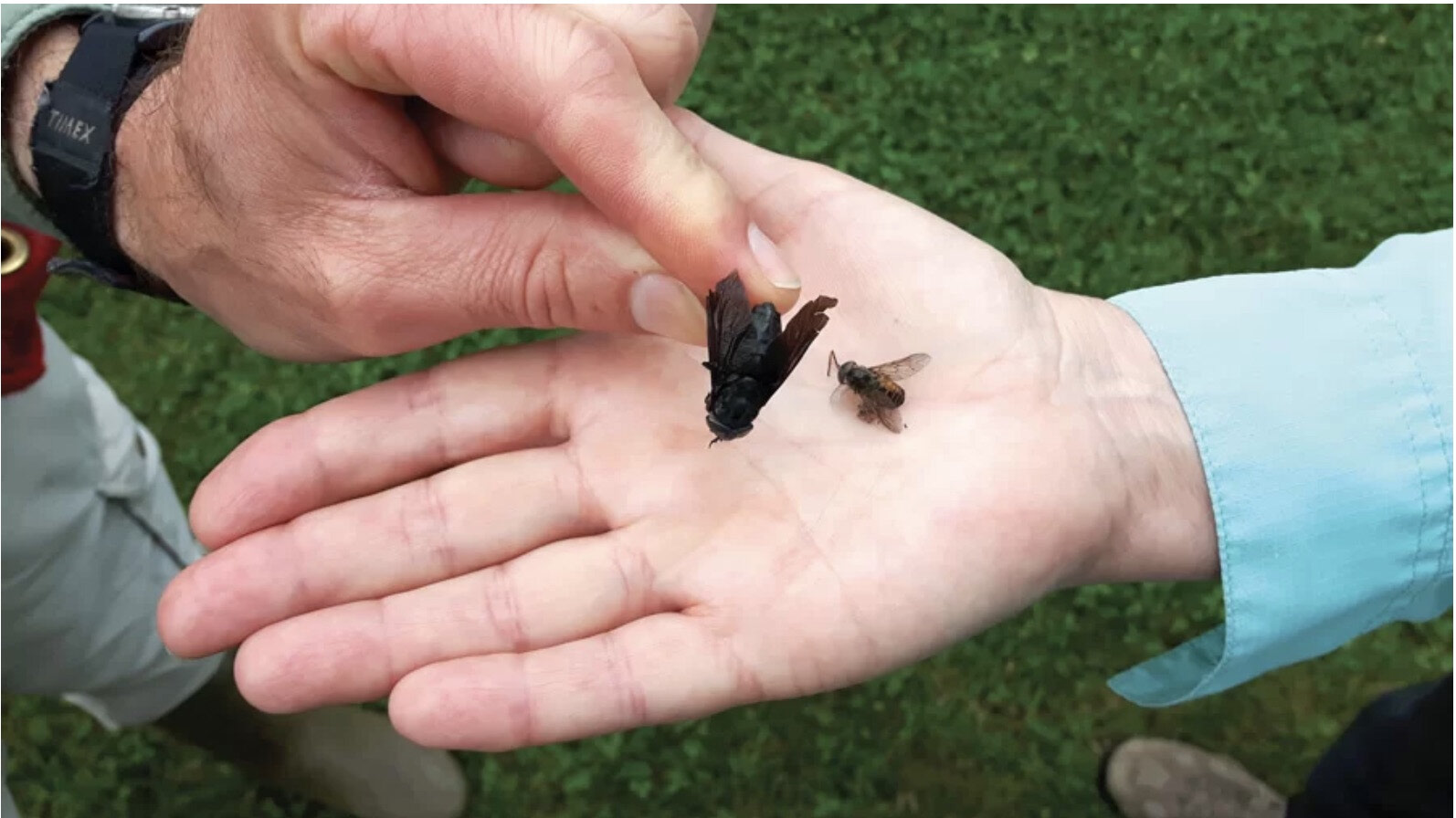Summer of record: weather, threatened birds -- and an immense fly

According to Environment and Climate Change Canada, this July in Ottawa was the wettest and coldest on record. With almost 250 millimetres measured, this is the most rainfall Ottawa airport has recorded for July since they commenced capturing such data in 1938. (http://bit.ly/2uAdr1U)
The average July rainfall is 89 milli-metres, so we’ve had an exceptionally wet month.
This isn’t news to farmers, some of whom may experience crop failures. Some crops haven’t ripened due to insufficient heat units. Some can’t be harvested because the land’s too wet for their machinery. (Sigh: I expect expensive fresh vegetables, don’t you?)
Here at Eric’s and my hobby farm, Spiritwood, on August 5 and 6 we welcomed visitors to our Gardens and Gifts Tour. Our guests explored our perennial beds and orchard, plus our raised-bed vegetable garden. They discovered green tomatoes, stunted peppers and eggplants, moisture-damaged grapes, and a couple of empty beds where successive plantings of parsnips, carrots and beets didn’t germinate.
Meanwhile, other crops have flourished. Although my original planting of 58 peas in early May failed, my second planting did well. Oddly, the peas are still producing: I say “oddly” because during a normal summer, peas would have died by now, from heat. However, low nighttime temperatures plus wet and cool days have allowed them to thrive.
Personal weather data
Being a techie, my husband Eric installed a weather station which records temperature, barometric pressure, wind (direction and speed), rain, dew point, and humidity. Such stations can feed data into Weather Underground, which in turn can improve the understanding of weather throughout the world.
This July, for instance, we recorded a low of 9.5C. Great for peas -- but heat-loving peppers and eggplant? Not so much.
I have other Spiritwood “July” observations.
Study of threatened whip-poor-wills
Carl Savignac, director of Dendroica Environnement et Faune, and Daniel Toussaint are biologists conducting a study of whip-poor-wills, birds which are increasingly rare. These ground-nesting birds are threatened, likely declining due to a combination of factors such as habitat loss, competition for that dwindling habitat throughout their migratory route, reduction in insect life, plus other factors.
All of us who joined Savignac and Toussaint on their exploration of Spiritwood during a remarkably sunny morning in July were excited to see a whip-poor-will suddenly flush from the ground. As I gazed at the verge of the forest, I discovered an egg. This was thrilling as none of us had ever seen this species’ nest before.
When Savignac’s report is published, I’ll reveal some of his findings about these beloved, all-too-rare birds.
Black horse fly
Not so happy was my discovery of an immense fly in my horses’ stable. Jet black, it was more than an inch long, with large eyes and dire-looking mouthparts. I showed its dead body (I killed it) to Savignac and Toussaint, who contacted an entomologist (scientist who studies insects). He identified it as a black horse fly and sent me the link to bugguide.net.
That site notes, “Does not often bite humans but leaves painful memories when it does. Can transmit bacterial, viral, and other diseases such as surra and anthrax, to humans and other animals through its bite. (Long 2001)
“The effect on livestock can be a serious problem. Blood loss and irritation from the flies can severely affect beef and milk production, as well as grazing. Livestock usually have no way of avoiding the painful bites, and millions of dollars have been spent trying to control these pests. (Long 2001)”
I’ll report more on this fly after speaking to the entomologist.
Meanwhile? Rather startlingly, I hear we’re going to have a sunny week: Let’s make hay while the sun shines.


